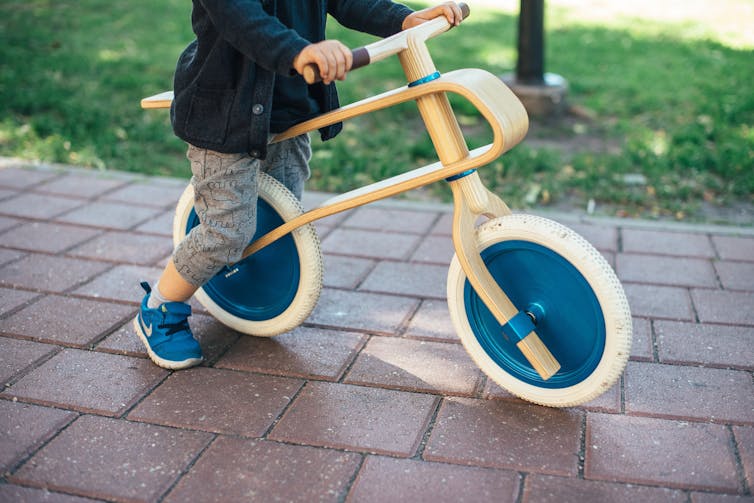How to co-parent after divorce
- Written by Priscilla Dunk-West, Senior Lecturer in Social Work, Flinders University
In Australia, around 21,000 divorces involving children occur annually. Separation and divorce can be an emotionally exhausting and difficult time, something which is recognised by the Family Court of Australia, which provides resources to assist people through the process.
Separation and divorce with children can be even more challenging, and many parents want to know the “right” way to parent now they’re no longer together.
A dominating narrative of children and divorce is around unfavourable outcomes of children whose parents have separated. But the assumption divorce is always bad for children is not correct.
Very little research has looked at “contented” separated parents’ experiences, so much of the negative outcomes for children are not based on positive post-separation parenting relationships.
Read more: How to tell your child you're getting divorced
Different possible arrangements
There are many ways separated parents arrange their living, and new terms are emerging to describe non-traditional arrangements. One such arrangement is “birdnesting” in which there’s a “family home” and a secondary home: the parents move between homes, with the children always remaining in the family home.
Birdnesting is dependent on financial resources though, and participants in our soon-to-be-published study into post-divorce relationships reported the choices about living arrangements were dependent on a range of factors such as work and educational requirements, and financial resources.
 For young children, having their favourite toys with them when they’re with each parent is important.
Jordan Sanchez/Unsplash
For young children, having their favourite toys with them when they’re with each parent is important.
Jordan Sanchez/Unsplash
For most of the parents in our study, children split their time between two homes in a 50/50 arrangement across a fortnight. For some people, this meant “one week on, one week off” whereas other children moved from one parental home to the other mid-week.
Depending on the age and activities of the children, participants described being increasingly flexible in relation to the arrangement of care practices. As children age, their needs change. School holidays produce opportunities to be more flexible. New sporting or leisure activities out of school hours may require adjustments to existing arrangements to allow for travel.
For younger children, having their favourite toys with them in either parents’ homes was important so parents talked about always packing a bag with their favourite things to go across households.
What was evident in all of the positive care arrangements we examined, was that they didn’t stay static.
The degree to which parents in our study communicated with their ex partner varied: some described their ex partner as a “friend” or “family” and had a weekly social engagement with them. Others communicated via text or telephone. But all of the positive parenting arrangements described communication as important.
Read more: What type of relationship should I have with my co-parent now we're divorced?
Advice for parents
Some of the first conversations separating parents have are around living arrangements and care practices. Who will take the child/ren to school? Who is responsible for transport? What happens on the child/ren’s birthday? These tangible questions are often useful to discuss at the first opportunity and provide a foundation upon which parents can negotiate when their child/ren’s needs change over time.
An optimal environment in which two people can parent is one where issues between them are set aside in order to see each other as allies in parenting. Given the lack of recognition positive post-separation parenting has in the research literature, we asked the participants in our study what was important for others to know.
 Arrangements for things such as birthdays will have to be made together.
freestocks org unsplash
Arrangements for things such as birthdays will have to be made together.
freestocks org unsplash
While there were differences across the group in terms of specific parenting arrangements (around food, screen time, and so on) the parents had many messages in common:
be child-centred. See the world from your child’s perspective and be mindful of their needs. For example, if one parent begins a relationship with someone new, decide together how this will be introduced and the role the other parent has in navigating this
make decisions together. Decide together what practices and rules are important to keep consistent across households. Some decisions require a united front such as arrangements for birthdays, educational and other commitments as well as behavioural expectations
create the right atmosphere for your children through the way you talk about their other parent and the way you communicate with them. Children are good at picking up non-verbal cues and are aware of tension between parents. Think about what kind of household will allow your child/ren to thrive and feel emotionally supported
work at your relationship. Positive post-separation parenting relationships are not always evident in the beginning (after separation) but they can be something to work towards. Things can change over time and although there may be an acrimonious separation, parents can and do change their interactions over time to create a positive parenting relationship
find what works for you. For some people being flexible and being friends works, whereas for others clear boundaries and expectations are important. Neither of these is the “right” way. Whatever works for you and your ex-partner is what’s important
go easy on yourself. It gets easier the more time passes from breaking up to re-establishing a relationship as co-parents. Go easy on yourself and keep the focus on being good parents.
Separation does not have to negatively affect your children’s outcomes or well-being. If both parents are committed to putting their differences aside in order to be the best parents they can be, there’s no reason children of divorce can’t grow up happy, healthy and well-adjusted.
Authors: Priscilla Dunk-West, Senior Lecturer in Social Work, Flinders University
Read more http://theconversation.com/how-to-co-parent-after-divorce-101608



















